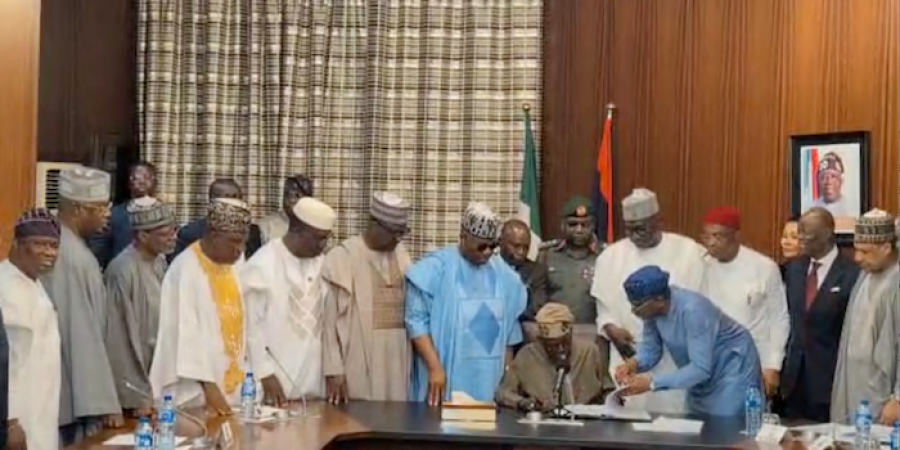President Bola Tinubu on Thursday signed into law the four new tax bills recently passed by the National Assembly, which among others, included renaming the Federal Inland Revenue Service (FIRS) as Nigeria Revenue Service (NRS).
At the event in Abuja, the President described the sweeping new legislations as pivotal to the success of the administration’s reforms and the country’s prosperity.
The bills are the Nigeria Tax Bill (Ease of Doing Business), which aims to consolidate Nigeria’s fragmented tax laws into a harmonised statute; the Nigeria Tax Administration Bill, which will establish a uniform legal and operational framework for tax administration across federal, state, and local governments.
Others are the Nigeria Revenue Service (Establishment) Bill, which repeals the current Federal Inland Revenue Service Act and creates a more autonomous and performance-driven national revenue agency— the Nigeria Revenue Service (NRS); and the Joint Revenue Board (Establishment) Bill, which provides for a formal governance structure to facilitate cooperation between revenue authorities at all levels of government.
The Nigeria Employers Consultative Association (NECA) expressed support for the new tax legislations.
However, at the signing ceremony held in his office at the State House, Tinubu said the occasion presented a new lease of life to every Nigerian and future generations.
“What we did a few minutes ago is the way forward for our country’s prosperity. Leadership must help people take off, lead the way, and navigate every turn and twist. We must help them reach their destination. That is what we are doing.
“We are in transit; we have changed the roads, we have changed some of the misgivings, we have opened the doors to a new economy, business opportunities. We have shown the world that Nigeria is ready and open for business,” the President stated.
Tinubu commended the leadership and members of the National Assembly for passing the bills despite initial misunderstandings.
“It was initially difficult, but not all roads will be easy in nation-building. What you have provided is leadership and courage in the face of mounting disputes. Nowhere in the world would tax reforms be easy,” the President said.
Earlier, Chairman of the Presidential Committee on Fiscal Policy and Tax Reforms, Mr. Taiwo Oyedele extolled the President’s leadership in enabling the passage of the four bills.
He thanked the President for all the support, without necessarily teleguiding the committee, and only asked necessary questions.
“History will remember you for good for transforming our country because you went for a fundamental reform,” he added.
Oyedele told newsmen after the ceremony that Tinubu has directed the proper implementation of the laws while ensuring the collective participation of all stakeholders.
His words: “The journey is just beginning, writing the law, no matter how beautiful, no matter how transformative, no matter how innovative, it means nothing if it is not properly implemented. So we are mindful of that. We are not going to relax.
“Mr. President has given us the charge that now is the time to move to implementation, and we are ready. We are prepared. It is not something we can do alone, even from the government side. It is something we have to be collective,” he added.
Oyedele added that the committee would now include the private sector, public sector, civil society, professional bodies as well as international partners.
According to him: “The private sector, public sector, civil society, professional bodies, tax consultants, everyone, including our international partners, who mean well and will work for Nigeria.
“This is the time to implement with sincerity, lesser purpose, and with purpose, so that when we look back in another one or two years, three years, five years, 10 years down the line, we will say, Yes, we came together as a people, and we directed our country well.”
Most significantly, Oyedele announced that essential goods and services, including food, healthcare, education, transportation, and accommodation, are now exempted from VAT, a move expected to lower the cost of living for millions of Nigerians.
“These essential categories account for over 80 percent of average household spending in Nigeria. By removing VAT, we’re putting money back in the hands of ordinary people,” he added.
Also speaking, Chairman of the Federal Inland Revenue Service, Dr. Zacch Adedeji, described the day as the happiest day of his life and the passage as a dream come true.
Adedeji further told newsmen after the signing ceremony that the implementation of the newly signed landmark fiscal reforms would commence on January 1st, 2026.
He said the new tax laws would now build a framework for a more focused and unlocking system, creating opportunities for all.
Adedeji further explained that the six months between the enactment of the new fiscal laws was designed to give Nigeria ample time to carefully prepare for their implementation, ensuring that all Nigerians are adequately sensitised.
He also disclosed that with the Nigeria Revenue Service Establishment law, the Federal Inland Revenue Service is now to be known as the Nigeria Revenue Service (NRS).
According to him, the new law now defines the NRS’ expanded mandate, including non-tax revenue collection, and lays out transparency, accountability, and efficiency mechanisms.
Said Adedeji: “The Nigeria Revenue Service (Establishment) Bill, the third bill, repeals the current Federal Inland Revenue Service Act and creates a more autonomous and performance-driven national revenue agency.
“Two hours ago, before we were FIRS, now we are NRS with expanded scope to focus on tax collection and with match efficiency”.
On his part, President of the Senate, Godswill Akpabio, eulogised Tinubu for his leadership qualities.
His words: “We have always known that you are a thinker, that you are intellectually sound, and that you care for your country. You campaigned based on change for the country.
“Those who have doubts can now dissect into two major actions. The first was the cancellation of fuel subsidy that many regimes could not oblitrate. You came and you did it, and today, Nigeria is better for it.
“Many did not know that by the time you took office in 2023, Nigeria was on life support, we were using about 98 percent of the daily revenue of this country for debt service, and almost 90 percent was on oil subsidy, and so Nigeria was heading to the brink of collapse.
“Then you came, and you said that God brought you for a time like this, and you are prepared to ensure that Nigeria is saved.
“Here again, you have harmonised the entire tax system in this country. Stamp Duties Act, I think it was in 1901, but last reviewed in 1939 and then here we are in year 2025 we are still operating uneven taxes and laws on taxations that were here before the colonial masters left, they were all incorporated into our laws and you said, this cannot be allowed to continue, Nigeria must be modernised and modernising the tax system means bringing more money for the development of the country.
“Today, you are signing these historic bills into Acts of Parliament, and I can tell you that even some of the states, when they see the outcome of what you are doing today, generations unborn will remember you.
“I want to say that myself and my brother, the Speaker, we had no doubt that you came with a vision, and we were determined in parliament that nobody can thwart your mission for this country. You campaigned on the basis of changing the country, changing the perception and so there was no need for people, no matter what they said, the parliament was determined to look at the bills and find out whether indeed they were good for this country and they will benefit the vulnerable and the common man and woman in the society.”
Also speaking to newsmen after the event, Chairman of the Senate Committee on Finance, Senator Sani Musa, and his counterpart in the House of Representatives, Hon James Faleke, praised the President’s courage, especially in the face of initial resistance.
Musa likened the reform to the removal of fuel subsidy, another tough but necessary decision by the Tinubu administration.
“This isn’t about raising taxes. It’s about plugging leakages, leveraging technology, and ensuring fair contributions across all sectors,” he said, adding that state and local governments should expect increased revenue from 2026 onward.
Faleke said the National Assembly had taken its time to consult widely and harmonise over 70 disparate taxes across federal, state, and local governments.
Reacting to the development, NECA expressed support for the new tax legislations.
Speaking in an interview with journalists at Nigeria Employers’ Summit in Abuja, on Thursday, the Director General of NECA, Mr. Adewale-Smart Oyerinde, commended the federal government for enacting the law and urged it to ensure its effective and smooth implementation to achieve the desired result.
“My immediate response is, Uhuru, thank God, because we have canvassed for this for a long time. The challenges of taxes, levies and fees have been an issue for the upwards of over 10 years.
“Efficiency of tax collection has been an issue for every rational stakeholder for a long time.
“And when the Excellency came up with the Presidential Committee, we think it was a step in the right direction. And the committee did a very good job coming up with that bill, with the many controversies and unnecessary distractions that came up. At the long last, the bill is to be signed today, which we believe is the beginning of the reform,” he said.
Oyerinde also urged the federal government to be diligent in the implementation of the tax law, adding, “it’s one thing for you to come up with the bill, the main work will start when the implementation starts, because implementation will always come with its own challenges that we’re all not aware of for now”.
“But we’re happy that he’s signing it today, we’re happy that the reality for organised businesses in the context of harmonised tax, harmonised levies and harmonised fees have started. So, for us, it’s good news,” he said.
When asked the specific aspect of the tax laws that would impact businesses, Oyerinde said all four bills would play complementary roles in promoting and driving the organic growth of businesses in the country.
“So, you don’t grow from the top, you grow to promote businesses, some that affect MSMEs, some that affect SMEs, some that affect big businesses, some that affect individuals. So, it’s a chain reaction that we expect, that affects the whole economy together.”
Regarding the implementation of the law, Oyerinde said NECA and the private sector are being represented in the presidential committee and they made their inputs readily available during the enactment of the tax law.
“I can rest assured that we are much more interested in the implementation. But that is the next phase of this engagement.
“And yesterday also, during the first session of the summit, I also mentioned that we’re also going to deepen our engagement with the Federal Inland Revenue Service (FIRS). Because the FIRS is the principal agency to drive this conversation,” he said.
Deji Elumoye and Onyebuchi Ezigbo
Follow us on:



